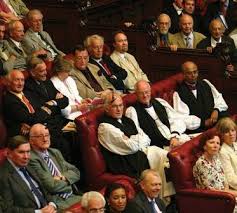This post relates to the fifth critical issue in Called to be One: What Now?, Power .
 The last sentence in this part of the report is interesting. The ecumenical task is to help the churches operate from a powerless base. The reason it is interesting is, it is impossible. What on earth do the authors mean?
The last sentence in this part of the report is interesting. The ecumenical task is to help the churches operate from a powerless base. The reason it is interesting is, it is impossible. What on earth do the authors mean?
There is no such thing as a 'powerless base'. There is always power. It is not equally distributed and often people do not know how to use it or the consequences of using it in their chosen way. But it is always there.
So, how might we think about power as ecumenists? The report touched upon power earlier and I commented earlier in this series .
Whatever we mean by unity, it is clear ecumenism must address inequalities of power. Despite the persistence of inequalities, we have to ask how unity can possibly make sense if some churches have power over others.
The report makes it clear some churches exercise power over others. These inequalities of power should alert us to problems we face with unity between groups, with different strengths in terms of numbers, finance and influence.
Ecumenism invites surrender of autonomy, proportional to the power each church holds. But this is complex because power works in so many ways. For example, the report raises the establishment of the Church of England. This might enable the Church of England to speak in places inaccessible to other churches but also inaccessible to churches in Scotland, Wales and Northern Ireland. Some churches might not wish to be represented in this way and some Anglicans might argue that other churches do not have a right to hold the Church of England accountable.
The complexity and vested interests that accumulate around power cause some Christians to explore other options through collaborative ministry (as the report suggests) or participative approaches .
I suspect the real problem is a reluctance by all parties to address issues of power directly.

Comments